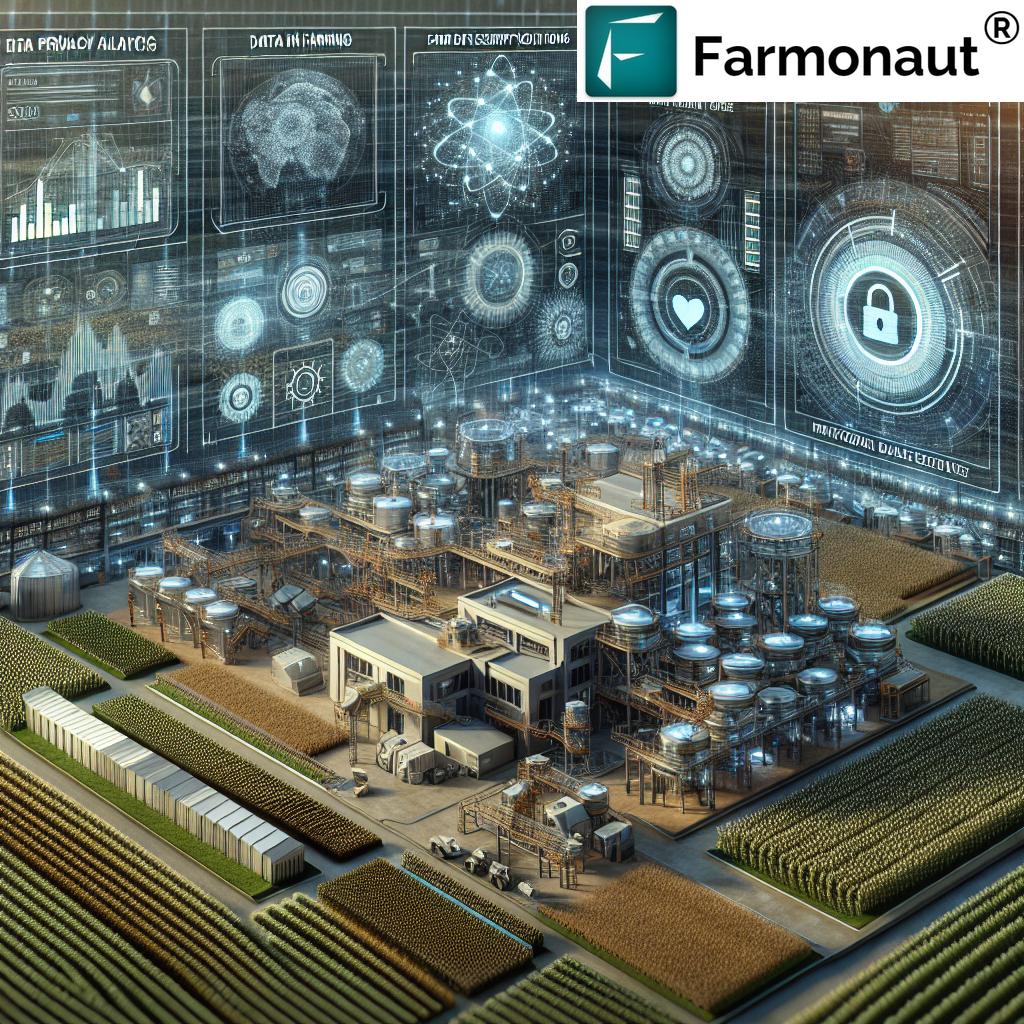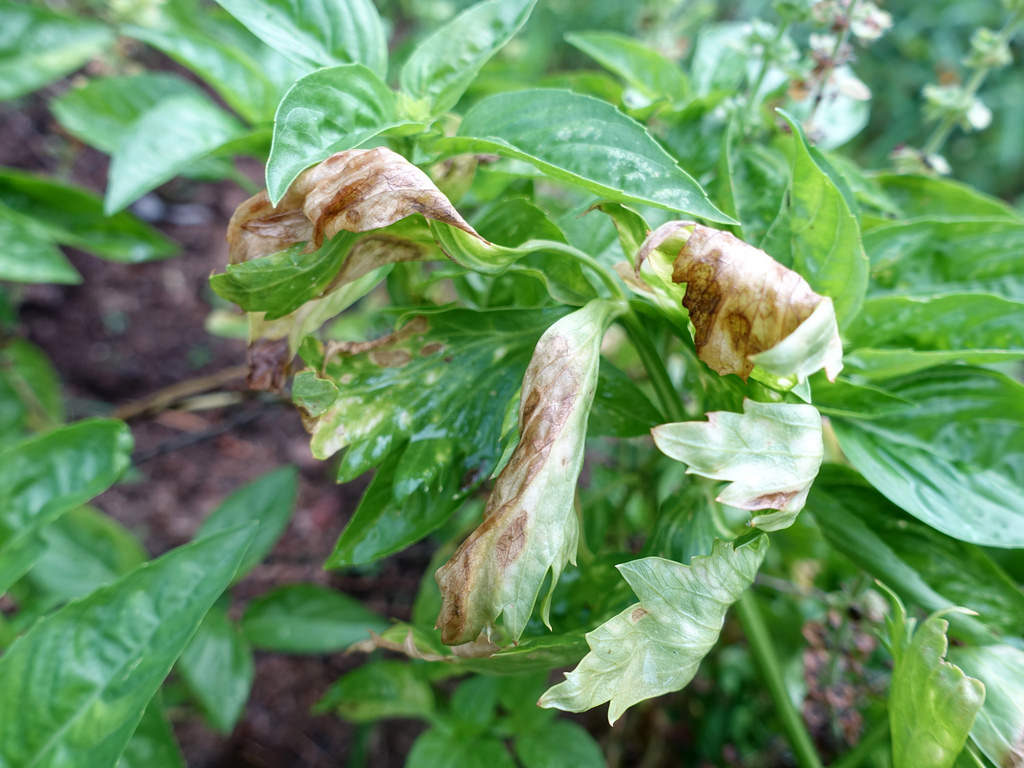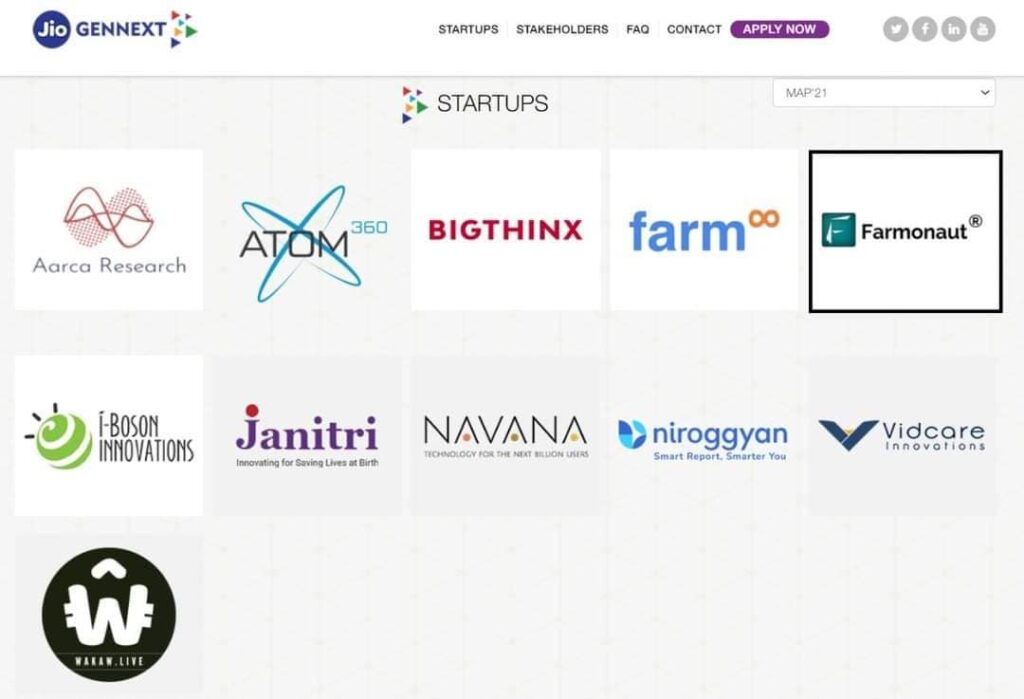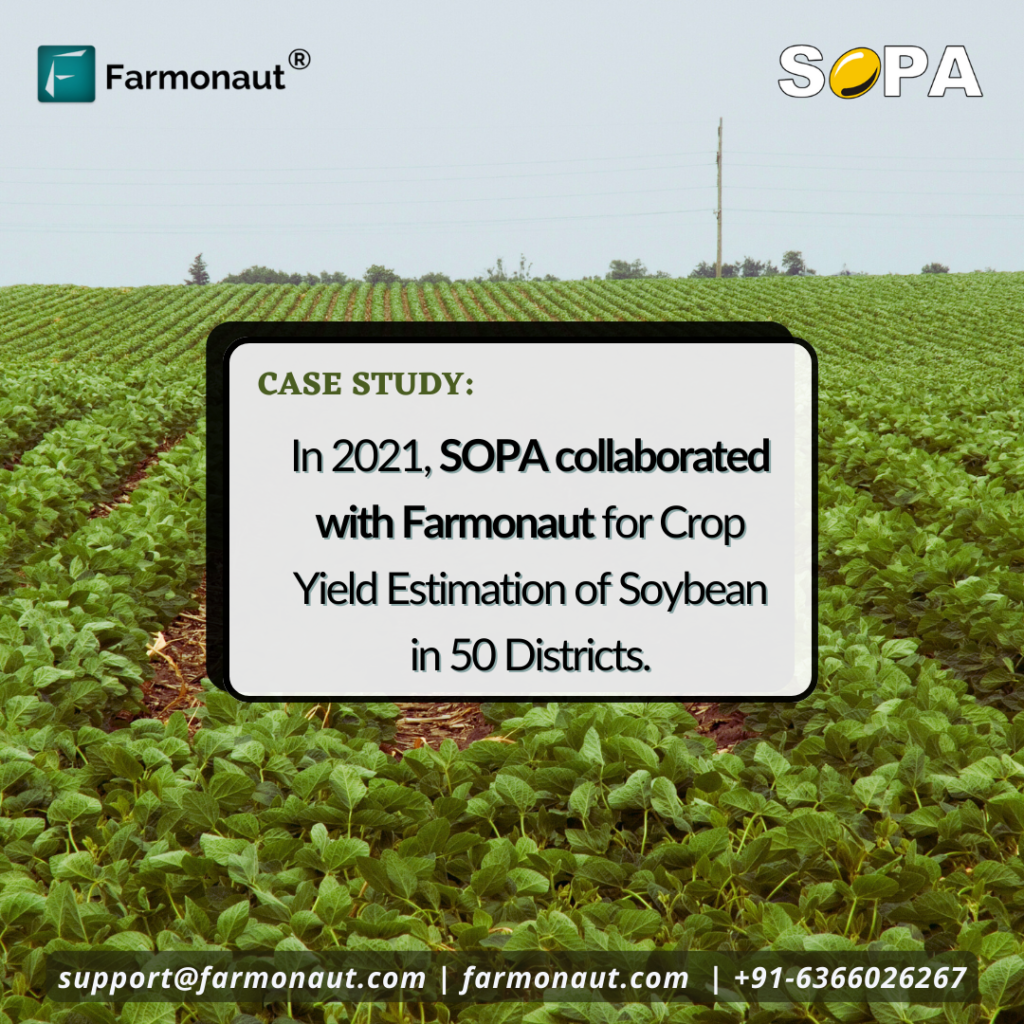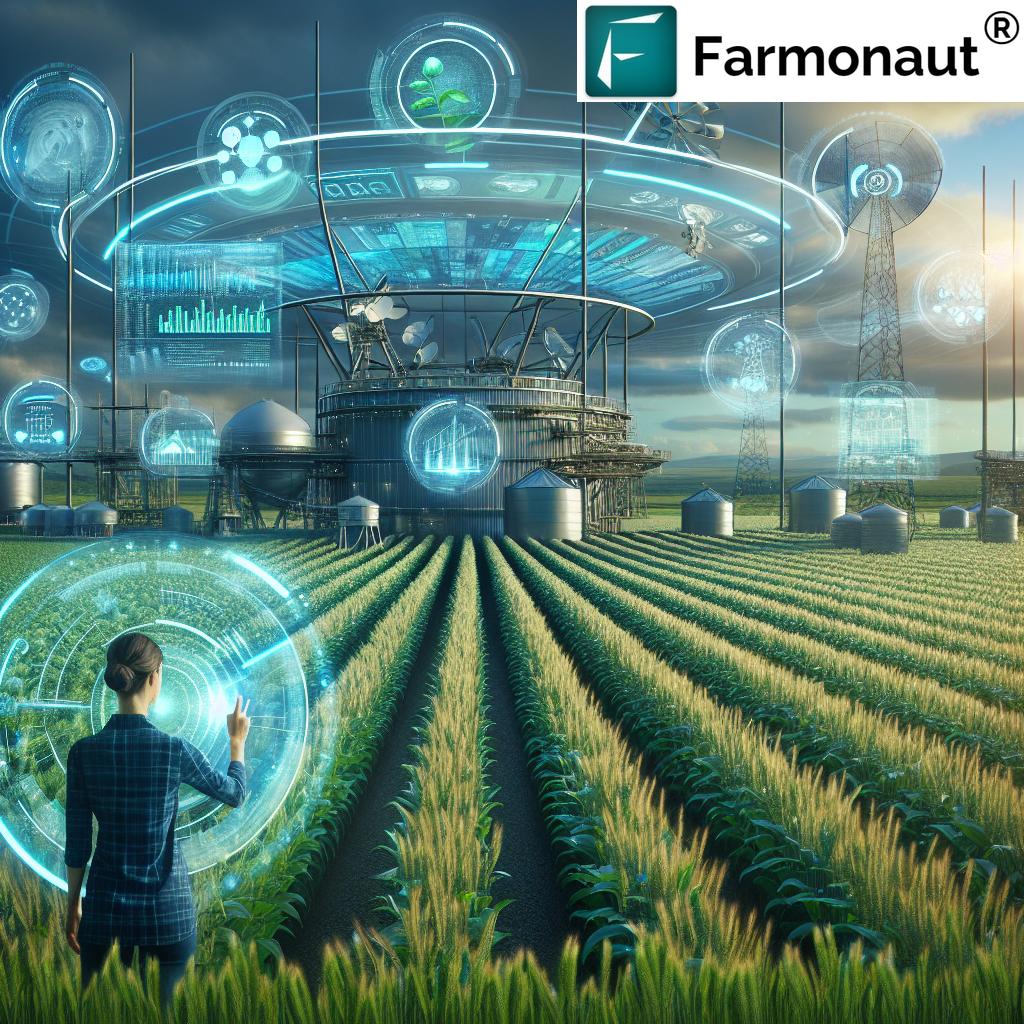- Introduction: The Shocking Legal Side of AgTech
- AgTech Legal Trivia
- Comparative Risk Impact Table
- 1. Intellectual Property Rights in AgTech
- 2. Data Privacy and Security in AgTech
- 3. Regulatory Compliance for AgTech Companies
- 4. Right-to-Farm Laws: Balancing Innovation and Tradition
- 5. Liability and Risk Management in AgTech
- 6. Environmental Regulations in Agriculture
- 7. International Agricultural Regulations
- Farmonaut’s Approach: Enabling Compliance & Innovation
- AgTech Regulations Trivia
- Frequently Asked Questions (FAQ): AgTech Legal Risks
- Farmonaut Subscriptions
- Conclusion: Shaping a Secure Future in AgTech
Agricultural Tech Law: 7 Shocking AgTech Legal Risks!
In the rapidly evolving landscape of agricultural technology, navigating the complex web of laws, regulations, and compliance requirements has become an indispensable challenge for farmers, AgTech companies, and all stakeholders in the farming technology ecosystem. As revolutionary innovations like precision farming, satellite monitoring, and AI-powered advisory systems integrate with traditional agricultural practices, the intersection with legal frameworks is not just inevitable—it is critical.
In this comprehensive analysis, we will explore the 7 most shocking AgTech legal risks that can profoundly impact the development, adoption, and prosperity of modern farming technologies. These risks span from intellectual property rights and data privacy in farming to environmental regulations and international agricultural laws, shaping how agriculture will be practiced, protected, and propelled into the future.
“Over 60% of AgTech startups face legal challenges related to data privacy and intellectual property rights.”
Comparative Risk Impact Table: The 7 Shocking AgTech Legal Risks
| Legal Risk | Estimated Prevalence (%) | Estimated Financial/Legal Impact | Primary Stakeholders Affected | Recommended Mitigation/Compliance Practices |
|---|---|---|---|---|
| Data Privacy Breach | 62% | High (>$1M per incident possible) | Farmers, AgTech Companies | Implement robust farm data security solutions, strict data access controls, regular audits, comply with GDPR and local data laws. |
| IP (Intellectual Property) Infringement | 58% | High (Litigation costs & damages) | Seed Companies, Tech Startups | Register patents for genetically modified crops and software, draft clear licensing/trade agreements, educate employees. |
| Regulatory Non-compliance | 81% | High (Legal penalties, product recalls) | AgTech Companies, Food Producers | Monitor RegTech updates, conduct internal audits, consult with legal counsel, ensure product certifications. |
| Right-to-Farm Law Conflict | 36% | Medium (Nuisance lawsuit costs) | Farmers, Local Communities | Understand local regulations, negotiate with neighbors, participate in policy advocacy, document farming practices. |
| Product Liability | 44% | High (Claims, compensation) | AgTech Device Makers, Farmers | Draft clear user agreements, maintain safety standards, train users, secure insurance. |
| Environmental Compliance Violation | 49% | Medium-High (Fines, project halt) | Farmers, AgTech Firms, Regulatory Bodies | Monitor carbon output, use eco-friendly methods, utilize environmental monitoring tech, stay updated on laws. |
| International Agricultural Regulations Breach | 40% | Medium-High (Market bans, export delays) | Agribusinesses, Exporters | Research target markets, ensure product compliance, maintain documentation, adapt R&D to market needs. |
1. Intellectual Property Rights in AgTech: Safeguarding Innovations
Intellectual property (IP) rights in agtech form the cornerstone of safeguarding the remarkable innovations that are transforming today’s agricultural sector. From cutting-edge biotechnology to digital farming platforms like those offered by Farmonaut, intellectual property in agriculture ensures investment, encourages research and development, and underpins the entire market acceptance of new products and technologies.
Focus Keyword: Patents for Genetically Modified Crops and Technologies
- Patents: Govern the protection of genetically modified plants, innovative software, AI-based analytics, and even agricultural drones. The Supreme Court, in J.E.M. Ag Supply, Inc. v. Pioneer Hi-Bred International, Inc., affirmed that utility patents can be granted for new plant varieties, highlighting the importance of intellectual property in agriculture.
- Trademarks & Branding: Distinctive marks are crucial for AgTech companies. They ensure trust, prevent counterfeiting, and help farmers recognize genuine innovations.
- Trade Secrets: Proprietary information, including AI algorithms and unique processes, is often safeguarded as trade secrets to keep a competitive edge.
However, with the rapid adoption of patented seeds, digital farm management, and other inventions, legal disputes—such as patent infringement concerns or unintended cross-pollination of genetically modified crops—can arise. Incidents like the Organic Seed Growers and Trade Association v. Monsanto Co. case highlight the potential repercussions for farmers facing claims of unintentional use of patented seeds.
Key Takeaways on IP Law in AgTech:
- Register patents for biotech products, software, and hardware inventions
- Document the development processes and maintain evidence of innovation
- Draft comprehensive licensing agreements, including for satellite imagery or farm management APIs like those available from Farmonaut’s API (Developer Docs)
- Educate staff and farmers about avoiding unintentional patent infringement
To further ensure compliance and protection, leveraging technology for documentation and implementation of IP strategies is crucial. AgTech platforms, including Farmonaut, emphasize data-driven evidence and transparency to assist in IP management.
2. Data Privacy and Security: Protecting Digital Farming Information
Modern AgTech solutions generate and collect massive amounts of data—from satellite imagery of crops and fields to weather patterns, resource usage, and farm equipment operations. The integration of digital tools into farming practices makes data privacy in farming a critical legal and operational concern. Not only do farmers entrust their sensitive operational information to tech providers, but breaches or unauthorized misuse can lead to severe financial losses, regulatory penalties, and irreparable harm to a company’s reputation.
According to legal experts, over 60% of AgTech startups encounter legal issues related to data privacy, much of which stems from navigating a patchwork of international and local laws, such as the EU’s GDPR or evolving data regulations in the US and India.
- Farm Data Security Solutions: Companies are increasingly required to implement robust technical and organizational measures to prevent security breaches and ensure the confidentiality of agricultural data.
- Consent Management: Farmers must be clearly informed about the information being collected and its potential usage or sharing with third parties.
- Cross-border data transfer: Sharing farm data globally requires strict compliance with international agricultural regulations about personal and business data.
Farmonaut, through its secure API and platform, exemplifies how stringent data protection can be achieved for farmers and enterprises using satellite-based management systems. Confidential data, from crop monitoring to resource allocation and blockchain-based traceability, is safeguarded using encryption and regular security audits.
Best Practices for Data Privacy in AgTech
- Deploy end-to-end encryption for all data in transfer and storage
- Train employees and farmers on data security and privacy policies
- Perform regular compliance checks to identify vulnerabilities
- Maintain transparency with all stakeholders regarding data use and protection
For those exploring advanced compliance approaches, Farmonaut’s blockchain-based product traceability solutions ensure transparency, authenticity, and trust by making every transaction verifiable—promoting more secure and accountable data management across the agricultural value chain.
3. Regulatory Compliance for AgTech Companies
Compliance for AgTech companies is a moving target as regulations evolve alongside technological progress. In the United States, federal laws such as the Federal Insecticide, Fungicide, and Rodenticide Act (FIFRA) and the Federal Food, Drug, and Cosmetic Act (FFDCA) set stringent requirements for product testing, approvals, and residue monitoring—especially in agricultural biotechnology and pesticide regulations. Failure to comply can result in significant legal repercussions, from market bans to costly recalls and brand damage.
In 2023, four out of five major AgTech firms reported issues adapting to new rules—highlighting why businesses must embed regulatory intelligence and proactive risk management into everyday operations.
Highlights of Regulatory Challenges in AgTech:
- Pesticide Registration: All pesticides and related products must be registered and comply with safety standards before market access, affecting both legacy and innovative solutions.
- Food Safety Laws: Every technology influencing crop protection or livestock must meet regulatory scrutiny under frameworks like FFDCA.
- IoT and Digital Tech: Digital platforms used for crop health monitoring or advisories (such as Farmonaut) should closely monitor evolving compliance requirements regarding data processing and farmer protection.
For businesses expanding beyond their home country, understanding not just national but also international agricultural regulations (see section 7) becomes crucial for sustaining market acceptance and minimizing legal risk.
Farmonaut’s digital solutions help companies record crop interventions, monitor compliance for pesticide and input application, and manage documentation required for audits or certifications, thus reducing manual errors and enhancing transparent regulatory compliance.
For integration of compliance-ready farm monitoring and reporting into your own apps or software, developers can access Farmonaut’s powerful Satellite Weather API—complete with developer documentation—to streamline regulatory documentation and enhance operational oversight.
4. Right-to-Farm Laws: Balancing Innovation and Tradition
As urbanization spreads and new residents encroach on traditional farmlands, the tension between age-old farming practices and urban expectations intensifies. Right-to-farm laws act as a shield for farmers, protecting standard agricultural operations from nuisance lawsuits that could otherwise impede essential activities such as late-night irrigation, farm equipment use, or the application of pesticides and fertilizers—even if those activities are noisy or generate odors.
- Scope: These laws protect farmers from litigation as long as operations comply with local and national regulations.
- Relevance to AgTech: As technology (self-driving tractors, automated irrigation, drone crop spraying) is deployed, disputes may arise over what constitutes “normal” agricultural practices.
- Limitations: These laws do not shield farmers from all forms of liability (e.g., environmental violations, patent infringement, or health risks).
Farmonaut’s advisory systems can provide documentation of standard practices, supporting farmers in potential legal processes should disputes occur and thereby promoting more peaceful coexistence between rural and urban interests.
5. Liability and Risk Management in AgTech
The rise of autonomous machinery, precision AgTech devices, and AI-powered systems introduces new complexities and potential legal liabilities for all involved. If a self-driving tractor malfunctions or a drone causes accidental crop damage, who is responsible: the farmer, the tech company, or a third-party integrator? Such questions demand legally sound agreements and explicit delineation of risk.
Focus: Managing Liability and Written Agreements
- Product Warranty: Clearly outline the scope, duration, and limitations of warranties for hardware, software, and advisory services.
- User Training: Offer or require training certifications for complex equipment to reduce operator error and potential liability.
- Indemnity Clauses: Insert indemnification language in contracts to allocate risks between AgTech providers and farmers.
- Insurance: Mandate robust insurance policies for operations involving drones, autonomous vehicles, or sensitive data.
Platforms like Farmonaut, while not legal entities providing contracts, offer the documentation and transparent tracking required to support farmers and companies in their liability management and dispute resolution.
For fleets and machinery management, Farmonaut’s fleet management platform enables agribusinesses to optimize vehicle utilization, track maintenance, and document activities—key factors in minimizing operational risk and improving liability coverage.
6. Environmental Regulations in Agriculture: Ensuring Sustainability
Environmental regulations in agriculture address the dual challenge of increasing food production and maintaining natural resource integrity. Innovations such as satellite monitoring, AI-based irrigation planning, and sustainable resource use (e.g., carbon footprint tracking) are subject to environmental scrutiny.
- Water, Soil & Biodiversity Laws: Use of novel technologies must be compliant with laws protecting water bodies, mitigating soil erosion, and conserving habitats.
- Drones and UAVs: Deployment for crop spraying or remote sensing must adhere to FAA or equivalent regional guidelines.
- Carbon Footprinting: Increasing regulatory focus on carbon emissions and sustainability reporting.
Farmonaut supports sustainable agriculture through technologies like carbon footprint tracking, offering businesses real-time data to monitor, report, and minimize their ecological impact, facilitate compliance, and boost their reputation.
7. International Agricultural Regulations: Navigating the Global Compliance Maze
International agricultural regulations can be both a barrier and an opportunity for FarmTech companies aiming for global reach. Each region combines unique regulatory philosophies—such as the strict stance against some GMO crops in the European Union—with complex import/export documentation and varying environmental requirements.
- GMO Crop Restrictions: In the EU, stringent rules tightly control the market entry and labeling of genetically modified products, creating obstacles for companies operating globally, unlike the U.S. or some APAC nations.
- Data Localization: Certain countries require all farm data to be stored locally, complicating cloud-based AgTech solutions and necessitating region-specific compliance.
- Documentation: Exporters must prepare thorough compliance dossiers—soil, water, food safety, and traceability data being increasingly mandated by import markets.
Solutions that automate record-keeping, lab analysis, and tracking via secure technologies like blockchain (see Farmonaut’s traceability platform) empower agribusinesses to withstand audits, rapidly provide compliance documentation, and win global market access.
For government bodies, NGOs, or agribusinesses managing large tracts of land internationally, Farmonaut’s large scale farm management suite offers scalable, satellite-driven monitoring and compliance-ready reporting—key for multinational operations and exports.
“In 2023, 4 out of 5 major AgTech firms reported compliance issues with evolving agricultural technology regulations.”
Farmonaut’s Approach: Enabling Compliance & Innovation in AgTech
Farmonaut stands at the forefront of the AgTech revolution, providing farmers, agribusinesses, and regulatory bodies with an integrated technology platform designed for compliance, transparency, and sustainability. By blending satellite data, AI-driven analytics, blockchain traceability, and resource management tools, Farmonaut ensures that its users meet—and often exceed—the demanding requirements of modern agricultural technology law.
Key Tools and Solutions from Farmonaut for Legal Risk Mitigation
- Satellite-Based Monitoring: Multispectral imagery for crop health analysis helps demonstrate regulatory compliance, precisely document application of inputs, and provide digital evidence in legal disputes.
- AI Advisory – Jeevn: Delivers real-time advisory to optimize practices in line with the latest environmental and safety regulations.
- Blockchain Traceability: Every transaction—from seed to shelf—recorded in tamper-proof ledgers builds trust, supports market access, and ensures legal accountability.
- Resource & Fleet Management: Streamlined operations result in fewer violations, improved insurance compliance, and better documentation for audits.
- Carbon Footprinting: Real-time tracking of emissions enables demonstrable progress towards sustainability and environmental compliance, unlocking new certifications and eco-conscious markets.
Additionally, Farmonaut’s API and API developer documentation empower other platforms to build compliance-ready applications—scaling the reach of legal risk mitigation across the AgTech ecosystem.
Frequently Asked Questions (FAQ): AgTech Legal Risks
What are the most critical legal risks for AgTech companies?
The top legal risks include intellectual property infringement (patents, copyrights, trade secrets), data privacy or security breaches, regulatory non-compliance, environmental violations, liability from device or algorithm malfunction, conflicts over the right to farm, and issues related to international trade or data localization laws.
How can AgTech platforms ensure data protection and privacy?
By employing end-to-end encryption, enforcing strict access controls, creating clear data usage policies, conducting regular security audits, and being vigilant about evolving data protection regulations both nationally and globally. Farmonaut is an example of a platform prioritizing robust data security and blockchain traceability.
Are all genetically modified crops patent-protected?
Many genetically modified plants and agricultural biotechnologies qualify for utility patents, but patentability depends on novelty, non-obviousness, and regional patent laws. Always consult legal guidance for specific crops and regions.
How do right-to-farm laws affect the use of new AgTech solutions?
These laws protect customary agricultural activities from nuisance claims, but do not grant immunity from environmental, safety, or IP-related liabilities. AgTech tools must be deployed in line with both right-to-farm statutes and broader legal frameworks.
What steps can AgTech innovators take for smoother international expansion?
Conduct detailed legal due diligence for each target market, invest in compliance documentation (including traceability and environmental certifications), and tailor tech deployments to diverse legal and data localization regimes. Platforms such as Farmonaut help simplify multi-jurisdictional compliance through digital record-keeping and real-time monitoring.
Farmonaut Subscriptions
Ready to transform your compliance, boost productivity, and safeguard your agtech operations? Choose from flexible Farmonaut subscription plans tailored for individual farmers, cooperatives, and corporations. Enjoy affordable and scalable access to premium satellite imagery, AI-based analytics, and compliance-ready transparency—all via web, Android, and iOS.
Conclusion: Shaping a Secure, Innovative, and Sustainable Future in AgTech
As agricultural technology continues to revolutionize food production and resource management worldwide, the landscape of agtech law grows more intricate and consequential. Every innovation in precision farming, digital data collection, biotechnology, and supply chain traceability requires proactive navigation of complex legal frameworks. By recognizing and addressing the 7 most pressing legal risks—ranging from patent protection and data security to environmental and international regulatory compliance—the sector can foster a culture of transparency, trust, and responsible advancement.
Solutions like Farmonaut play a vital supporting role, providing the data-driven infrastructure and security protocols needed to fulfill compliance obligations, mitigate risk, and ensure that farmers, agribusinesses, and governments can thrive in a sustainable and legally resilient agricultural ecosystem.
By staying informed, embracing best practices, and leveraging advanced AgTech platforms, stakeholders across the agricultural value chain can not only survive but excel in the era of comprehensive agricultural tech law.



